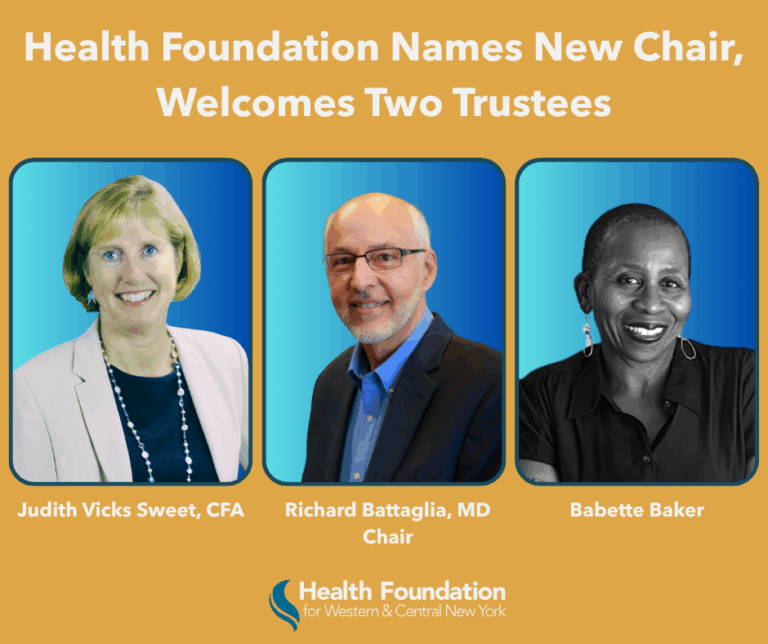Across our community, people have stepped up to lend a hand in the face of the coronavirus pandemic. By taking actions such as donating food and supplies to local food banks, making donations to organizations on the front lines, or simply checking on neighbors, many people have found a way to do their part.
We are proud to share the story of how a Health Foundation founding trustee and his wife, both retired physicians, used their skills and experience to make a difference during the height of the COVID-19 response in New York City.
As COVID-19 cases increased across New York State in March and April, with the most rapid increase in New York City, Governor Andrew Cuomo put out a call for retired or non-practicing doctors to lend a hand. Dr. Lito Gutierrez and Dr. Elisabeth Zausmer jumped at the chance to volunteer.
“We saw our former colleagues working, and saw more and more people getting sick, and we knew we had to contribute. We had skills that could be put to use,” said Dr. Gutierrez, who served on the Health Foundation’s Board of Trustees from 2005 through 2014, including serving as Chair from 2011 through 2014. His wife, Dr. Zausmer, is on the board of the League of Women Voters of Buffalo and Niagara Falls, a Health Foundation community partner.
When they saw the call for physicians, the doctors reached out to contacts at New York State to offer their services. Within a few weeks, they had been assigned to work at the Javits Center, the convention facility-turned-command-center designed to care for overflow COVID-19 patients as hospitals neared capacity levels.
Dr. Gutierrez retired from clinical practice in 2005, and Dr. Zausmer did the same in 2007. Both doctors worked for the Office of Professional Medical Conduct, a branch of the New York State Department of Health, after retiring from clinical work. Dr. Gutierrez fully retired in 2012, and Dr. Zausmer followed suit in 2013.
So how did it feel traveling to the epicenter of New York State’s COVID-19 emergency?
“We had a moment when we were driving down when we thought, ‘what are we doing?’” said Dr. Zausmer. “I hadn’t practiced in a long time, so we didn’t feel equipped to be working on the front lines, but we knew we had the skills to help. I never felt scared or that my health was at risk, but we didn’t know what to expect.”
“It was an emotional decision, not a logical one,” said Dr. Gutierrez with a laugh.
Their years of clinical experience and their language skills—Dr. Gutierrez is a fluent Spanish speaker, and Dr. Zausmer has proficiency with the language—made them a valuable resource in the city’s COVID-19 response.
Upon arriving in New York on April 9, they were assigned to serve as an intermediary between military staff, civilian medical staff and city personnel. The Javits Center was set up to handle COVID-19 patients who were in various stages of their illness. Some were recovering, but too sick to go home, and some needed rehabilitative care before they could be discharged. Others needed to be quarantined, but did not have a housing situation that would allow for it. This approach ensured that local hospitals had the capacity to care for patients who were more severely sick.
Drs. Zausmer and Gutierrez spent their first few days fielding calls from doctors who wished to transfer patients to the Javits Center field hospital. Then, due to demand, they were re-assigned duties and began coordinating communication with family members of patients to share information and updates on their condition.
While this role was very different from their career experience providing hands-on care, they soon witnessed the impact of their work on patient families.
“A man called about his father, who had recently been sent home with instructions for his care and medication, but he didn’t understand what to do,” said Dr. Zausmer. “I had him snap a picture of the instructions and text it to me, and that helped me advise him. That small moment allowed him to care for his loved one and carry on with their lives.”
“Just being able to make the phone call and tell the patient’s family ‘I’m a physician,’ had a very impactful and comforting effect on them,” said Dr. Gutierrez, who noted that his fluency in Spanish led to him communicating with patient family members as far away as Honduras or El Salvador.
After 12 days of volunteering with Operation Gotham, Drs. Zausmer and Gutierrez returned home on April 22. They both emphasized how impressive the response and coordination had been on the ground in New York. In their experience, the coordination between military, government and civilian officials was highly efficient and effective. But, they hope all levels of government and health care systems will see this crisis as the opportunity to develop plans and processes that will ensure we can handle a similar emergency in the future.
Will they volunteer in this way again if they have the chance? Both doctors said, without hesitation, yes!
“As things began to slow down and our time in this role ended, we both knew we were prepared to go back again if we were needed,” said Dr. Zausmer.
“I don’t need to be in a hospital to help,” said Dr. Gutierrez. “All I need is a phone.”



